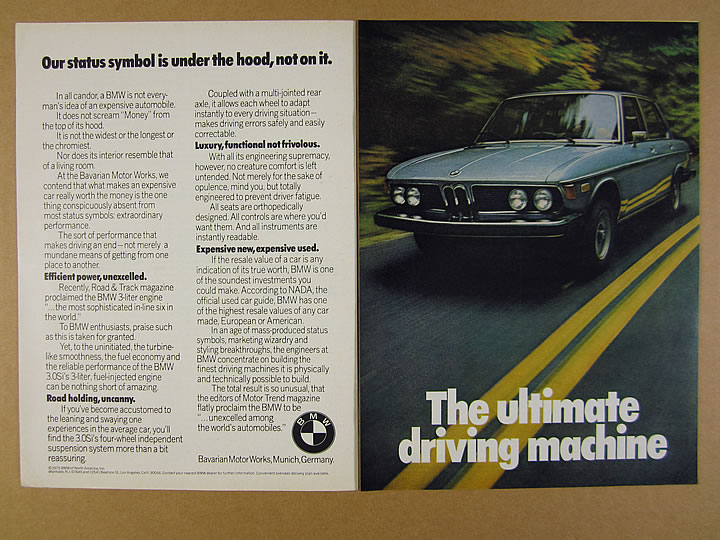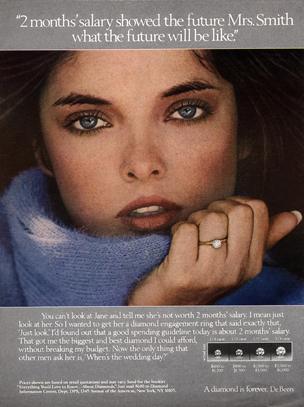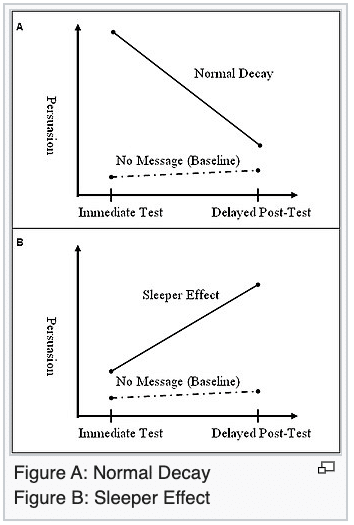Who told you that BMW was the gold standard for sports sedans?
Or that Absolut was a premium vodka?
 Or that the rule of thumb for buying an engagement ring was to spend two-month’s salary?
Or that the rule of thumb for buying an engagement ring was to spend two-month’s salary?
Chances are, no single, specific person told you these things. It’s just what “they” say, isn’t it?
Except that someone did tell you those things: the companies themselves told you through their advertising.
- BMW claimed the title of “The Ultimate Driving Machine” in all of their ads
- Absolut vodka equated their brand name with “the absolute best” via a legendary print campaign
- While DeBeers flat out created the 2-month’s salary rule of thumb in their ads.
 And yet somewhere along the line a strange alchemy took place.
And yet somewhere along the line a strange alchemy took place.
What the companies said about themselves stopped being a self- proclaimed boast and transmuted into commonplace knowledge.
Stuff that everyone “just knows.” Stuff that “they” say.
So how did that happen, and how can you make that magic work for you?
Unlocking this mystery starts with “The Sleeper Effect”
Normal persuasive messages lose impact over time.
You are exposed to them, they sway you a bit (or not), and then you forget the message and the persuasion fades to nothing.
Think of your average “motivational” material and you’ll know exactly how rapidly impact can decay.
But some persuasive messages display the opposite behavior.
 The persuasion is small at first, but grows larger and stronger over time.
The persuasion is small at first, but grows larger and stronger over time.
What kind of persuasive messaging does this?
High impact messaging that contains a discounting cue, according to the psychologists.
For clarity, translate “high impact” as “engages the imagination with powerful mental images”
And read “discounting cue” to mean “credibility challenge,” as happens simply from being an advertising claim.
The Cause of the Sleeper Effect
When we view a high impact ad, the right-hemisphere of the brain takes in the imagery and emotion, while our logical left hemisphere discounts the messaging due to the obvious promotional intent.
Then the rational discounting fades over time, while the high-impact imagery lives on undiminished in the imagination.
Eventually we forget that it was BMW who claimed to be the “Ultimate Driving Machine,” and we just remember that BMW makes really sporty, fun-to-drive cars.
The advertising claims stop being what the company says, and start being what “they” say.
One might imagine that an ultra-high impact message might create a sleeper effect with just one exposure of a single ad, with dreams of Apple’s 1984 Ad dancing in our heads.
But for most of us mere mortals, the effect will require longer, more frequent exposure via a campaign, as in the BMW, Absolut, and DeBeers examples cited earlier.
Putting “The Sleeper Effect” to Work For You
If you’re running a branding campaign and you try to simply feed listeners “information,” one of two things will happen:
- The information will be deemed irrelevant and promptly tuned out, or
- The information will be heard, but forgotten over time.
If, on the other hand, your branding campaign engages listeners imaginations with
- High impact imagery,
- Charged emotions, and
- Strong claims that are repeated over time,
then the sleeper effect will begin its work.
Listeners might initially discount your fantastic imagery and claims at first, which is to be expected — they’re hearing these things in an ad, after all.
But over time that discounting will fade, and your positioning will become what “they” say about you, rather than what you said about yourself.
That’s the alchemy that turns leaden self-promotional claims into 24-Karat, Solid-Gold Brand reputation.
The two most important “steps” in applying this to your advertising are:
- Create high-impact ads with strong imagery, emotion, and bold claims, and
- Repeat the imagery, emotions, and claims in each ad through a thematically
consistent campaign.
And that’s how to put the sleeper effect to work for you.
If you think you might like help creating a thematically consistent campaign of high impact branding ads, feel free to reach out.
- Getting a Foot in the Door — Of Perception - November 27, 2025
- What Digital Superstars Know About Offline Advertising - November 17, 2025
- Unmistakable: A Tale of Two Boots and Branding Done Right - November 8, 2025
